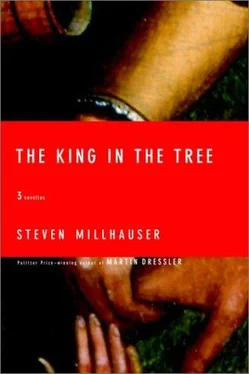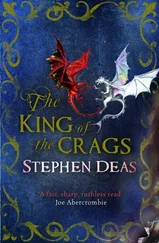By continuing carefully in the direction from which Mary had come, he managed to enter the far doorway with only a slight bump on the shoulder. But now, instead of the familiar dining room he had imagined, he found himself in a soft, sagging chamber, a chamber of velvety wall hangings and a rug so thick that he seemed to be sinking up to his ankles, and he tried to remember when he might have been in such a place, which felt like a big, furry animal — he was walking on the back of a sleeping bear, at any moment it might wake up and fling him off. Something fell to the floor with a soft thud. Juan crouched down and patted about, feeling suddenly a glass globe the size of his fist.
When he rose, holding the globe, he sensed that he was moving in a different direction; perhaps he had passed through a doorway into still another room.
Now wearily, without hope, he made his way through the fertile and prolific dark, striking against unknown objects that sometimes fell over, pausing once to place the glass globe on what seemed to be a small silk cushion. As he passed from room to room in Hood’s inexhaustible house, which kept growing new corridors, chambers within chambers, additional stories, entire wings, he had the sensation that he was leaving bits and pieces of himself in every room, an arm here, an elbow there, the bones of his chest over there, so that if he ever arrived at Georgiana’s room there would be nothing left of him — nothing but a faint agitation of air. But he no longer believed in Georgiana’s bedchamber. It was so far away that it was in a distant land, where the inhabitants were said to have one eye in the center of their foreheads and long blue hair. He thought of knights who had to cross mountains and rivers and oceans and slay giants the size of entire towns in order to gain admittance to the bedchamber of a lady at the top of a tower so high that gradually it grew vague, as if it were turning into mist or dream. He thought of the multitudes of animalcula in a single drop of water, of infinite suns. He came to another stairway, another room. Wearily he opened the door.
Moonlight shone on a canopy bed with rose-colored curtains. On a small glass table he recognized a large fan with ivory sticks, which Georgiana had once asked her maid to fetch from her room.
As Juan advanced toward the foot of the rosy bed he felt a desire to postpone his arrival, in part because he wanted to make certain that his mind wasn’t suffering from an illusion brought on by his weariness, and in part because, if it proved to be an illusion after all, he wished to let it continue for as long as possible before the bed began to tremble, waver, and melt away. At the foot of the dream-bed he paused before the closed curtains, the lower half glowing a cool silver-rose in the moonlight from the open window. He reached out his hand, which glowed suddenly as if it had burst into flame, and drew a curtain back.
In the shadowy depths of the bed Georgiana and Augustus lay side by side, their shoulders and heads raised by pillows. He could barely make them out, there in the shadows, as if they were reluctant spirits summoned out of the invisible world. He was not surprised to see them lying there, waiting for him to speak, for hadn’t he always known they liked to be together? They seemed to gaze at him as he stood holding the curtain aside. Georgiana had pulled the sheet up to her neck, but carelessly, so as to expose one shadowy shoulder and part of a dim breast. Her scarcely visible hair fell over one shoulder and vanished onto the coverlet. He thought he was able to make out a gaze that was frank, slightly amused, slightly irritated, as if to say: “So you have found me at last, Don Juan.” And indeed he had found her at last, though now there was nothing left of him, after his long journey. Hood’s eyes in his boyish face, he was sure of it, were large and melancholy. Raising one arm as if in a gesture of welcome, Hood said with deep feeling, “My dear Juan.” Then he allowed his hand to fall back heavily on the bed, where it bounced once and lay still. Juan wondered whether the words he had heard were part of a sentence abruptly terminated, or whether they represented the complete and exact expression of an elusive thought.
Juan stood holding the curtain aside, feeling their ghost-gaze upon him. Then he opened his fingers and watched as the curtain plunged back into place. He stood staring at it, as if trying to remember how it had come to be there, then yanked it open with a violent rattle of rings. He drew his sword and felt a tremor pass along his arm. In the air beside his face he saw with surprise a naked sword.
He thrust it back into the scabbard and said, “I will be leaving in the morning.” He took one step back, removed his hat, and bowed low, sweeping the plumes to the floor. Then he turned and walked out of the room.
A change seemed to have come over the night. Perhaps dawn had begun to break, perhaps his eyes had grown used to the dark, in any case Juan made his way through rooms filled with dim masses and murky forms that sometimes took on the shapes of cabinets and couches. He heard movement; the servants were up; and here and there the heavy curtains had been drawn back from the windows, admitting moonlight in some rooms and faint dawnlight in others.
He descended a staircase. At the bottom stood a cluster of chambermaids and scullery maids and footmen, talking at the same time. He heard “Mary” and “the river.” Over the front lawn he saw that the sky had begun to turn pearly gray.
Don Juan made his way through the vestibule and down the steps onto the sloping lawn, where servants were moving in many directions; it occurred to him that he had never seen more than two or three at a time. He followed a groom and a chambermaid down toward the river. Three footmen came through the osiers, carrying Mary. She lay with her head flung back and water dripping from her hair. “She’s alive, Sir. No need for alarm. She’ll pull through, she will.” Someone thrust a wet piece of paper into Juan’s hand. “We found this, Sir. Pinned to her gown.” The note read, in neat, stiff letters: HERE LIES MARY HOOD, WHO DIED FOR LOVE.
The sun was coming up. A high window opened and a chambermaid leaned out, holding her arms wide as if to greet the new day.
In the coach headed south for Dover, Don Juan leaned back and closed his eyes. Late-summer sunlight warmed his cheek and the back of one hand. A leathery creak of springs mingled with a clatter of wheels and the dark, soothing thud of hooves. Don Juan saw light playing on the bridges of Venice, trembling on the sides of gondolas. Through the coach window he heard the single sharp call of an unknown bird.
The Queen is a whore — cut off her nose. The Queen is lecherous — burn her. Such are the interesting remarks one hears at court, from those who dislike the King’s new bride. Others, it is true, speak of the Queen’s exceeding beauty. By this they mean the Queen is guilty and should be hanged. For my part, I believe the young Queen is beautiful and must be watched closely.
I, Thomas of Cornwall, faithful counselor of a once happy King.
The King is a vigorous man, well favored in countenance, deep-chested and hard-muscled, youthful in appearance despite his forty-four years. His forehead is smooth, his eyes large and dark. His broad hands, well tested in the managing of horse and sword, are remarkable for their long fingers, which lend a suggestion of grace and even delicacy, though I have seen him crush a man’s collarbone with a single blow of his fist. When, in his crimson mantle trimmed in ermine, he walks beside the Queen, the eye is pleased with its vision of power joined with beauty.
There is nothing in the King that can incite ridicule.
Читать дальше












